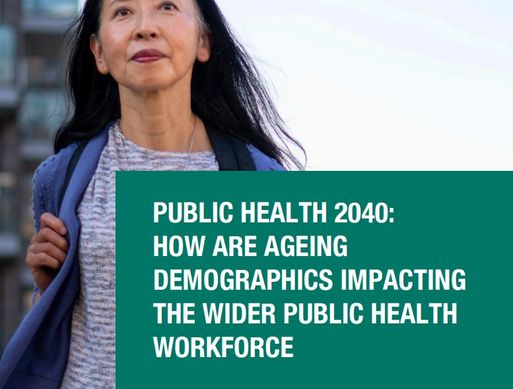How are ageing demographics impacting the wider public health workforce?
Author: Shakar Tayib 03 October 2024 1 min read
People are living for longer. What does this mean for the public health workforce?

The population is living and working for longer. While this can have positive outcomes for our society, it also means that we must prepare for the ways in which this will change the delivery of public health in the UK over the coming years.
Our health needs will change in the future, and we need the wider public health workforce – who are key to ensuring a healthy population – to be prepared. They are uniquely placed to help manage these changes to the public’s health and will be essential in mitigating the effects of an ageing population.
Following on from our report on unlocking the potential of the workforce, we have published a topical briefing – alongside our briefings on climate change and Technology and AI – looking at the future needs of the workforce to ensure that they have the support needed to protect the public from the impact of new threats on their health.
How much are ageing demographics shifting in the UK?
In England over the last 40 years, the number of people aged 65 and over has increased by over 3.5 million. The number of people aged 65-79 is predicted to increase by nearly a third to over 10 million in the next 40 years, while the number of people aged 80 and over will more than double to over 6 million. 40% of the working age population are also expected have a long-term health condition by 2030.
All of this will alter the ability of the Wider Public Health Workforce to plan and deliver their services as the population’s health needs change.
What are the main issues with having an ageing workforce?
Sectors across public health fear that an ageing workforce will eventually result in a major loss of expertise once they retire. This will cause a significant skill gap, with less than 30% of organisations saying they have a knowledge retention plan in place. Older workers may also need to take on more caring responsibilities, and they are also more likely to have long-term health conditions such as musculoskeletal disorders, heart problems or chronic breathing difficulties and are also more likely to have multiple conditions.
How is an ageing population driving workforce exit?
With an ageing workforce comes more workers who require support with long term health conditions, and potentially reduced levels of mobility. Organisations will need to invest more in workplace health, such as supplying occupational health support so individuals can continue doing their work. However, this poses its own challenges in a resource-limited sector.
How will workplaces adapt to an older workforce?
Adaptations in the workplace can make sure that the ageing workforce will remain in work. Poor health and caring responsibilities in the workplace will likely force older workers out of the job market which will reduce the quality of public health services delivered, particularly as knowledge and experience across public health shrinks. Flexible working conditions could enable people to continue working in some capacity, which can lead to greater productivity and higher retention.
How can we mitigate the effects of an ageing population on public health?
Early access to preventative and targeted occupational health services, adapting working patterns and adjustments to the workplace are all crucial to enabling people to manage their health and remain in employment.
The Government must create a joined-up approach to ensure that those with caring responsibilities are able to continue working in a way that suits them. Employees must be able access the occupational health support they will increasingly require to remain in work and stay healthy and productive. Organisations must be supported by the government to provide their workforce with provisions such as guaranteed occupational sick pay, which will reduce sick days, prevent worsening health and increase productivity
This cannot be achieved solely by government, however. Businesses need to recognise the value older workers bring to them and do their part to adapt workplaces and work patterns, ensuring that they are supported to remain in work if they choose.

Public Health 2040: How are ageing demographics impacting the wider public health workforce?
PDF6.1mb
This briefing looks at the impacts of an ageing population and aging workforce on public health.
Download file


